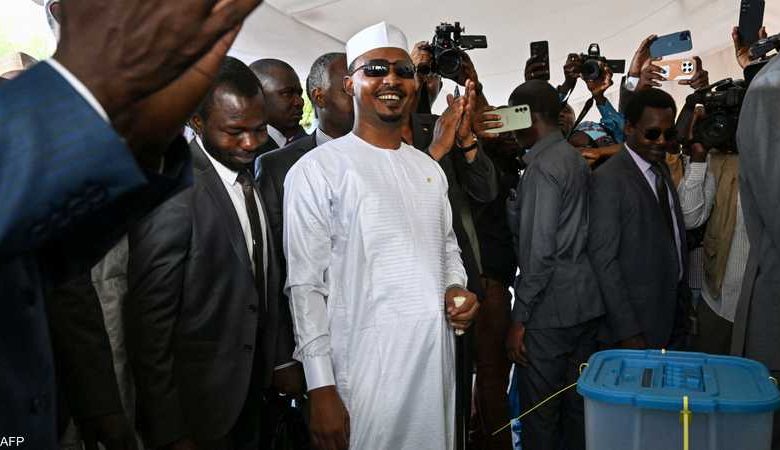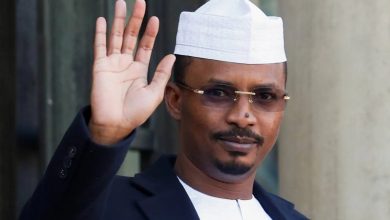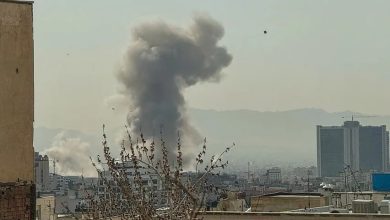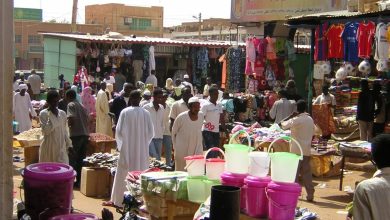Mahamat Kaka’s Policy in Darfur Begins to Backfire

Sudan Events – Agencies
Zaghawa Turn Against the President’s Weapons Deals with the UAE and His Support for Hemeti’s Rapid Support Forces Militia
Two urban battles are raging—in Khartoum and El Fasher in North Darfur—that may set the stage for the next phase of Sudan’s destructive war: either a de facto partition of the country under rival military regimes, as seen in Libya, or further fragmentation into a Somalia-like scenario. (As reported in Africa Confidential, Volume 65, Issue 18, unable to defeat each other, the leaders continue fighting.)
Fighting in both cities is intensifying as the rainy season ends. Both sides are committing more atrocities. The Sudanese Armed Forces are accused of launching an air raid on Khartoum’s central market on October 12, killing at least 23 civilians, though the intended target was said to be a base for the Rapid Support Forces (RSF) militia in the city center. The capital and its suburbs have become a battleground for warring factions.
The battle for control over El Fasher, the capital of North Darfur, brings greater destruction for civilians, leading to what the United Nations describes as the world’s worst food emergency, forcing millions to face man-made famine. Regardless of who wins in El Fasher, the fighting is likely to spread across the region, toward the Libyan border.
Both sides consider this battle a decisive point. RSF Commander General Mohamed Hamdan Dagalo, known as “Hemeti,” was initially reluctant to launch an assault on El Fasher, believing such a battle would delay his plans to consolidate RSF control over Khartoum and expand its grip on cities in the north and east.
However, his supporters insisted that El Fasher be the priority. Victory there would demonstrate the RSF’s ability to control and govern the five federal states of the Darfur region. The battle has taken on a new dimension, given the intensity of the fighting and the resources both sides are investing in it.
Beyond the national conflict between the RSF and the Sudanese Armed Forces, El Fasher is also witnessing clashes between Hemeti’s fighters and Arab militias allied against the Zaghawa group. For Arab soldiers within the RSF, victory in El Fasher is far more important than gaining control over the resource-rich state of Gedaref in eastern Sudan. They see this fight as an identity war, driven by motives stronger than mere looting. Initially, Zaghawa communities spanning Darfur and eastern Chad stood on the sidelines of the El Fasher battle, but they now see it as an existential fight.
This has dramatically changed the situation. For both sides, the battle has become a matter of survival and regional leadership. Even Zaghawa opponents, like Abdullah Banda, a former leader of the Justice and Equality Movement, have returned to Darfur to defend their people after fleeing to Libya to escape prosecution.
The escalating conflict in El Fasher extends its impact into Chad. Many Chadian officers and soldiers are taking leave and crossing the border into Darfur, bringing vehicles, weapons, and ammunition with them. The large number of border crossings prompted General Abakar Abdel Karim Daoud, Chief of Staff of the Chadian army, to order thorough inspections at military barracks.
The Rapid Intervention Force, led by Othman Adam Dicky, the personal assistant to President Mahamat Idriss Déby “Kaka,” is tasked with monitoring the movements of Sudanese refugees and preventing the smuggling of heavy weapons to and from North Darfur. Most of the fighters in the Rapid Intervention Force belong to the Gorane tribe, which has a history of complex rivalry with the Zaghawa (former leader Hissène Habré was from the Gorane, but his army commander and the father of the current president was Zaghawa).
Within the Zaghawa communities in Chad, particularly the Beygat or Béri, opponents of President Mahamat Kaka are attempting to exploit the battle in El Fasher. They claim that Hemeti’s military strength relies on President Kaka’s support for the UAE in transferring arms to the RSF, as documented by the New York Times last month.
Divisions within the Zaghawa in Chad run deep. In February, President Mahamat Kaka’s cousin and political rival, Yahya Dillo Djérou, was killed in a clash with the Rapid Intervention Force. As anger over his death mounts, his brother Othman launched a social media campaign claiming to lead a group of Chadian Zaghawa fighters opposing Hemeti’s forces in El Fasher, asserting they are prepared to return to Chad to seek revenge against Mahamat Kaka.
These divisions among the Zaghawa over alliances in Darfur pose a threat to President Mahamat Kaka. They also shed light on his close ties with the UAE. An Emirati security official accompanied President Mahamat Kaka on his trip to meet French President Emmanuel Macron last year.
These developments have encouraged opposition factions to form a broad opposition coalition in Chad. While it is difficult to gauge their strength, they are emboldened by the president’s waning legitimacy and the growing perception that his officials are enriching themselves through deals with the UAE.
As tensions have risen in recent months, attempts have been made to bring Sudanese and Chadian leaders together to prevent the escalation of cross-border conflict in Darfur. The French external security agency (DGSE) invited Minni Minnawi, leader of the Sudan Liberation Army, to Paris. Minnawi subsequently traveled to Nigeria to meet with representatives of President Mahamat Kaka, and Hassan Bourgu, a former member of the Sudanese National Congress Party, also participated in the meeting.
Efforts to bring the two sides together stalled during the Forum on China-Africa Cooperation (FOCAC) in September. Jibril Ibrahim, the Finance Minister and leader of the Justice and Equality Movement in Darfur, is also attempting mediation.
These efforts suggest that the UAE, facing increasing pressure behind the scenes, may begin to scale back its support for Hemeti. If this happens, Mahamat Kaka could lose Abu Dhabi’s sponsorship and his ability to face his rivals.
This may explain why Mahamat Kaka is attempting to improve his relations with France and the United States. After calling for the withdrawal of US Special Forces during his election campaign, he returned to strike a deal with them to bring them back. Following some tensions with Paris earlier this year, he now says he plans to visit France. The dismissal of Idriss Youssouf Bouy, who ran his presidential office, was likely a result of this policy shift.
Idriss Youssouf Bouy had been a close friend of President Mahamat Kaka since childhood. His opponents had nicknamed him “Makambo,” referring to Moussa Dadis Camara’s bodyguard, who was killed during the attempted assassination of the Guinean leader in December 2009.
Bouy served as Mahamat Kaka’s private secretary from April 2021 until June 2022, when he was dismissed due to his involvement in a hydrocarbon company embezzlement case. In his book, From Nomad to President, Mahamat Idriss Déby claims he forced Bouy to return 13 billion CFA francs (about $21 million) and threatened him with harsher punishment if the crime was repeated. Bouy was reinstated in January 2023.
No official reason has been provided for Bouy’s recent dismissal. One explanation is his involvement in managing the UAE’s support for Hemeti, profiting from side deals. By dismissing his close ally, Mahamat Kaka may be trying to appease Zaghawa critics of his alliance with Abu Dhabi, showing he is not entirely dependent on this policy.
Mahamat Kaka may also want to make concessions to Western governments critical of Bouy’s handling of public funds and his involvement in embezzlement and trafficking. When Mahamat Kaka visited the Élysée Palace in February, the French informed him that Bouy was unwelcome. The US Drug Enforcement Administration (DEA) also raised questions about Bouy’s involvement in the drug trade when he was Deputy Director of the National Security Agency in N’Djamena.
Now that Bouy has fallen from power, he faces accusations from his opponents for being responsible for the failures of Mahamat Kaka’s policies since 2021.



